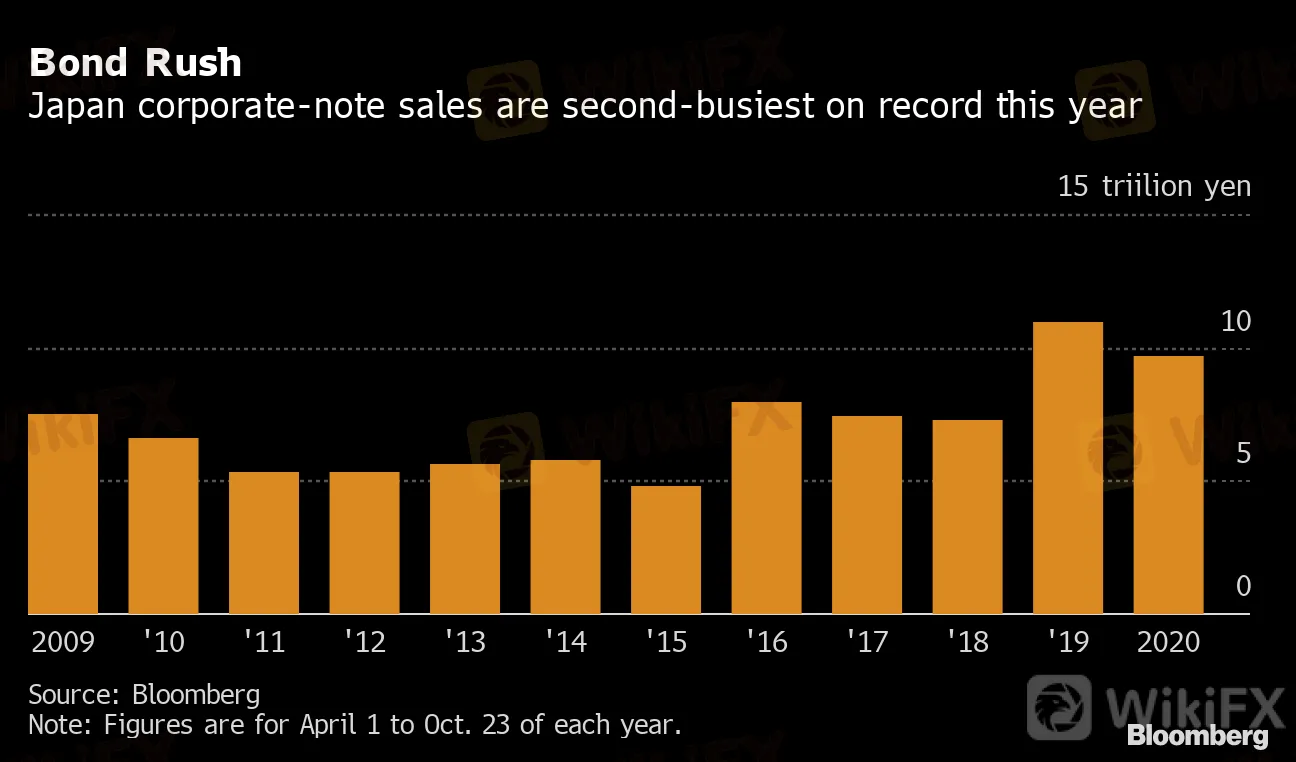简体中文
繁體中文
English
Pусский
日本語
ภาษาไทย
Tiếng Việt
Bahasa Indonesia
Español
हिन्दी
Filippiiniläinen
Français
Deutsch
Português
Türkçe
한국어
العربية
Japan Set for Blockbuster Bond Deals After NTT Revives M&A Push
Abstract:Japan is headed for more mergers and acquisitions after a recent deal from one of the country‘s biggest telecom firms, and that’s raising hopes for lucrative landmark bond sales to finance the spree.
Japan is headed for more mergers and acquisitions after a recent deal from one of the country‘s biggest telecom firms, and that’s raising hopes for lucrative landmark bond sales to finance the spree.
NTT president Jun Sawada, left, and NTT Docomo CEO Kazuhiro Yoshizawa during a news conference on Sept. 29.
For investors, giant bond sales are attractive because issuers usually need to pay a premium to compensate for the added risk of large repayments. While Covid-19 has caused global M&A to tumble this year, many Japanese firms are continuing to eye overseas targets as a shrinking population limits business prospects at home: in a survey of Japanese executives, 57% said they will actively pursue M&A in the next 12-24 months, according to consulting firm EY.
{10}
Bond Rush
{10}
Japan corporate-note sales are second-busiest on record this year
Source: Bloomberg
Note: Figures are for April 1 to Oct. 23 of each year.

“Generally speaking, issuers tend to offer additional coupons -- a volume premium -- when they are selling bonds bigger than what they normally sell,” said Haruhiro Ikezaki, managing director and head of debt capital markets division at Mitsubishi UFJ Morgan Stanley Securities Co. An increase in demand for corporate bonds after the Bank of Japan expanded its buying of such debt earlier this year may also encourage companies to sell more notes to pay for M&A, he said.
Premiums on big M&A-related bonds may partly explain, for example, pricing on Takeda‘s 500 billion yen ($4.8 billion) subordinated bonds sold last year. The 2079 notes that are callable in five years, rated A- by Japan Credit Rating Agency Ltd., had a spread of 175 basis points at issuance. By comparison, Sumitomo Chemical Co.’s similar-maturity 100 billion yen junior debt also sold in 2019 with the same JCR grade had a premium of 85 basis points.
See also: Nomura Seeks M&A Bankers as Japan Deals Surge During Pandemic
{22}
Japanese issuers raising mammoth M&A funds have tended to sell foreign-currency bonds as well on concern that the yen market wouldnt be able to absorb a huge offering. Takeda has sold dollar and euro notes in recent years, and Asahi this month issued euro debt for the first time in more than three years.
{22}
NTT may also choose that option, according to Seiji Matsuzoe, a partner in Baker McKenzie‘s Tokyo office who focuses on financing transactions in domestic and overseas capital markets. “It’s possible that the company may combine foreign currency bonds in its funding in order to avoid paying additional costs in the domestic market.”
Disclaimer:
The views in this article only represent the author's personal views, and do not constitute investment advice on this platform. This platform does not guarantee the accuracy, completeness and timeliness of the information in the article, and will not be liable for any loss caused by the use of or reliance on the information in the article.
WikiFX Broker
Latest News
First Unfair Trading Case Reported Under South Korea’s Virtual Asset User Protection Act
Cinkciarz.pl Under Fire: Frozen Accounts, Missing Funds
“Predict and Win” Big Rewards! Join the Contest Now
Mitrade Ensures Trader Protection Backed by Lloyd's of London
Rs. 1 Billion Ponzi Scam: 3K Investors Duped by Engineers
Upbit Faces Severe Penalties for AML and KYC Violations
Yen's Weakness Raises Concerns
Why the Federal Reserve Is So Important
Boerse Stuttgart Digital Secures EU-Wide MiCAR Crypto License
South Africa's FSCA Warns against CMFX Trading
Currency Calculator






